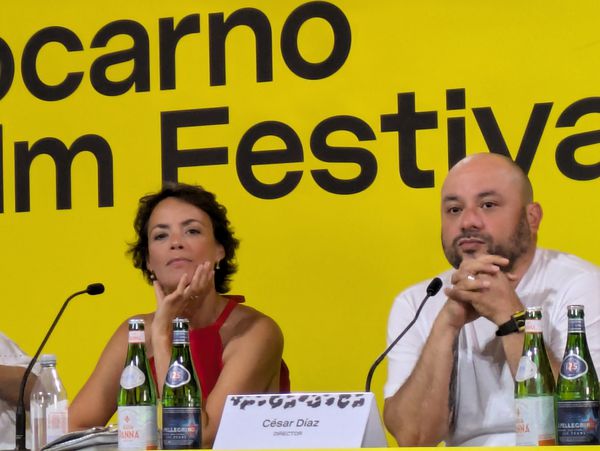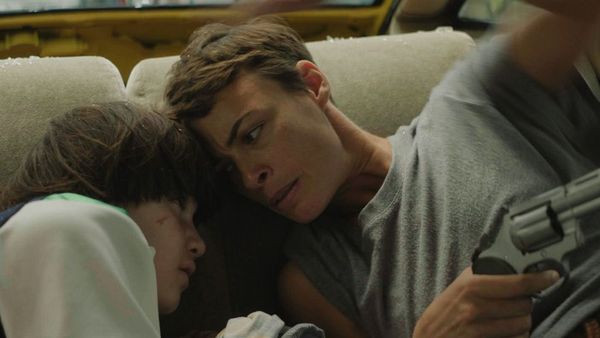 |
| Bérénice Béjo and César Díaz in Locarno Photo: Amber Wilkinson |
I was interested to see you use actual archive film near the start of the film - why did you decide to do that?
CD: When I was in the editing room, I realised that people don't know about the way Guatemala works. Even if they know a little bit, just the horror of this war is huge, so I tried to put the people in context. So you could see what she was leaving behind. For me it’s important to understand.
It really brings home the brutality of the regime.
CD: Yes, even if you see this guy shooting Marco’s father in the street, you could say, “It’s a mafia thing.” - you really don’t understand what’s going on. But when you see the news and the way people were getting killed you can understand. When you make this huge ten year jump just after these archive images, you really wonder what happened during those years.
You drew on some elements from your own life for Mexico 86. How did your family feel about the fact that you were making this film because, in a way, it’s drawing on their experience as well.
CD: For the people that really lived the story, it’s almost a betrayal. I remember a phrase, “I will never tell the truth about itt even if I get tortured”. So just putting this in a film is, in a way, betraying them. At the same time, I think there’s some kind of homage to them - I think they did a very important thing and I learned a very powerful lesson from it. I think a country without movies is a country without memory. It’s the opportunity to ask questions together through a screen.
I was thinking it might quite hard for you to commit this kind of story to the screen because of pressure not to tell it.
CD: Of course. I remember, even in the Nineties, a Gabriel Garcia Marquez book named Clandestine in Chile. Everyone said that it was a betrayal and that he was a traitor because he was telling that story. In a very cinematic way, I remember the book.
The child character of Marco in your film is fascinating because although it has a thriller framework, at heart it’s a mother and son drama that’s playing out against this strong backdrop. Because of that the casting is crucial, how hard was it to find the actor to play Marco?
CD: It took time and many callbacks, because I really wanted to be sure. We tried to have casting with their experience - “What is the saddest moment you’ve lived, which is the happiest moment?”. Then, little by little, to understand who they are. It was painful because at the end, I had two kids and we had to say no to the other kid. I had really got to know him and his mother so it was tricky but I’m really confident in the choice of Matheo.He’s a very adult child because he is diabetic so he needs to take his blood sugar and he knows very well that he needs to do that because if not, he will die. This makes him like a grown up. I used this part of his personality somehow to work with Marco.
 |
| Bérénice Béjo and Matheo Labbé in Mexico 86. César Díaz: 'I scripted it a lot. But I never gave Matheo the whole script. We went little by little' Photo: Courtesy of Locarno Film Festival |
My generation got used to soldiers in the street, tanks, gunfire. People would get killed on TV on a Sunday morning, so some of the archive is from the Sunday morning - they were thieves and they were killed live on TV.
You bring home the sense of grief that Marco feels having not been living with his mother and the prospect that he might lose her again. Do you use improvisation to try to get to those feelings or do you script it a lot?
CD: I scripted it a lot. But I never gave Matheo the whole script. We went little by little. Most of the feelings of the character, we got to via another path. I took him to a place where he was saying goodbye to a mother, I took him to a place with a lot of fear in a trusting environment. He’s a very smart kid so he understood.
The film is emotionally very complex. Some films have might have suggested she was a terrible mother but in this case, it’s more that she is conflicted - and stuck in conflict of both types.
CD: And she’s not an activist as a job. She’s being a revolutionary is part of her and makes sense of her life.
You bring home the weariness of being a revolutionary for years on end as well.
CD: There is a huge price to pay. This is not easy. I can’t imagine what is going on right now in Ukraine, I can’t imagine right now what is going on in Palestine. It must be difficult and the choices are sadly the same. What are you going to choose? Are you going to defend your country, your society and the way you are living or are you going to send away your own child.
Trying to understand Guatemala right now brings me back to history.
How do you feel about Guatemala today?
I think it was hopeful because we shot in Guatemala and Mexico and a few days after we left Guatemala for Mexico there was a revolution in the country because they elected a left-wing president but the corrupt system didn’t want to let him take his place. It was a huge revolution there, for 100 days people stayed outside to stake his claim. They forced this government to take place - it was amazing. It was a hopeful moment. I think a country without movies is a country without memory. It’s the opportunity to ask questions together through a screen.
Read what Bérénice Béjo told us about why Mexico 86 reminded her of her own family





















